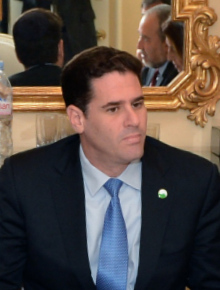A Quote by John F. Kerry
Those localized efforts take a long time and they don't deal with the larger issue of ISIL and the question of what you're going to do to really have a solution here. We have to save Syria.
Related Quotes
I've said for a long time there is no military solution to the crisis in Syria. There has to be a diplomatic solution. ISIL cannot be part of it. Al-Qaeda cannot be part of it, and Assad cannot be part of it. We are dealing with issues that have been going on for centuries, and I'm not sure the administration fully appreciates that.
Russia has a long-term interest in Syria. Israel by and large does not have an issue with those long-term interests that Russia has in Syria. Israel has an issue with an Iranian regime that is trying to establish this land bridge, and that openly calls and actively works for Israel's destruction. And if you ask a hundred Israelis what they want to see in Syria, you're going to get 150 answers.
The agreement is fundamentally that we want to try to resolve this. The agreement is that ISIL is a threat to everybody, and we need to come together to find a way to fight ISIL. The agreement is that we want to save Syria, keep it unified, keep it secular. So surely in those very fundamental principles on which we could agree.
In the fight against ISIL, we cannot rely on an Assad regime that terrorizes its people; a regime that will never regain the legitimacy it has lost. Instead, we must strengthen the opposition as the best counterweight to extremists like ISIL, while pursuing the political solution necessary to solve Syria's crisis once and for all.
I met with many of - a number of [Syrian] refugees in Berlin the other day, and I was struck by how educated, intelligent, and patriotic they are. They want to go back. They love their country. And there are so many of them still in Jordan and in refugee camps in Lebanon and in Turkey, that if you could create the climate within which they could begin to come back, I believe there is such a history of secularism within Syria, even tolerance within Syria, that if we can deal with ISIL, yes. That's the key. And with ISIL there, not a chance.
Take the life issue. This issue requires a president and an administration leading our nation to understand the importance of life. This whole faith-based initiative really ties into a larger cultural issue that we're working on. It begins to affect the life issue, as well as the human dignity issue, because when you're talking about welcoming people of faith to help people who are disadvantaged and are unable to defend themselves, the logical step is also those babies.
Now let's make two things clear: ISIL is not 'Islamic.' No religion condones the killing of innocents, and the vast majority of ISIL's victims have been Muslim. And ISIL is certainly not a state. It was formerly al Qaeda's affiliate in Iraq, and has taken advantage of sectarian strife and Syria's civil war to gain territory on both sides of the Iraq-Syrian border. It is recognized by no government, nor the people it subjugates. ISIL is a terrorist organization, pure and simple. And it has no vision other than the slaughter of all who stand in its way.
If [Bashar] Assad himself could save this whole process by saying, "I will engage in a managed transition where we all work together to stabilize the government, save the institutions of government, and turn on ISIL and preserve Syria." That could happen. It all depends on one man, and Russia and Iran should not be so stubborn here that they tie this whole thing up simply because of one person.
What I'm suggesting is we are going to look back, and we're going to see what happened in Syria, and we're going to see the larger destabilization of the Middle East, the rise of extremism, and we're going to wonder... Why didn't we at least try to force a political solution - at an acceptable cost to us, because no one is saying we should send in ground troops - and if we did it would be worse than doing nothing... If we do not act, we are going to look back and wonder why we didn't.
We achieved a deal with the Russians that didn't wind up in two days of strikes that would have sent a, quote, "message," but would not have removed the weapons. We struck a deal to get all of the declared weapons out of Syria. Never before in a conflict has that ever happened, that during the conflict weapons of mass destruction are taken out of the zone of conflict. And thank God we did that, because if we hadn't done that, today ISIL would have those chemical weapons in large parts of the country.
I have defended Syria for a long time, so I was admiring Syria, I have admired your president very much. I hope at some point to be able to meet him and shake his hand. I think he is the greatest man in a very difficult period, and especially with what's going on right now, in terms of Lebanon and its relations with Syria. But absolutely, even from my perspective, and it shows you how the Zionist media around the world controls and affects all of us. Even those of us who are aware of it - it's subtly affecting.
People talk about [Bashar] Assad running Syria. He doesn't control his own country. He's down to about 20, 25 percent of the country. What is this fiction that he is somehow the only person who can save Syria? There's - with Assad there, there is no Syria. So that's what the Iranians and the Russians need to really begin to focus in on.



























